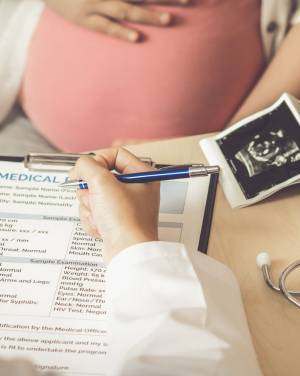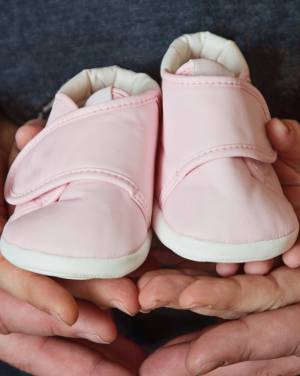Anticipating Pregnancy-Related Changes
- The first pregnancy is especially exciting for many women. How does a pregnancy unfold? What changes can I anticipate?
- Even though each pregnancy is a unique experience, there are fixed landmarks of every pregnancy. Knowing these can help you discern the physical changes within your body. Nevertheless, the emotional response to pregnancy varies significantly from woman to woman.
- This article explains pregnancy milestones and describes its general stages.
- 🤰Still uncertain whether you are pregnant? Take our Online Pregnancy Quiz.
Do you have any questions or concerns? Write your message directly here ⬇️
Early Pregnancy: The Initial Weeks
Conception, marking the commencement of pregnancy, is the first significant milestone — closely followed by a second major event: Realizing you are expecting.
- Conception: Pregnancy begins at fertilization, followed by the implantation of the fertilized egg in the uterus. For more information, go to How Does Pregnancy Happen?
- Early Symptoms: About two weeks later, early signs of pregnancy may start to become noticeable. Read more about Pregnancy Symptoms or take the Symptoms Test.
- Pregnancy Test: Verification is usually sought through a pregnancy test or a pregnancy confirmation appointment.
- Correct Positioning? Using ultrasound, your gynecologist can determine whether the pregnancy is within the uterus (intrauterine) or ectopic.
Note: Since the weeks of pregnancy start counting from the first day of your last menstrual period (LMP), you are already considered two weeks pregnant at conception and four weeks pregnant by the time your next period becomes overdue.
Pregnancy Stages — An Overview
The nine months or 40 weeks of pregnancy are divided into trimesters of approx. three months each. The division of trimesters differs from region to region. The first trimester commonly lasts from week 1 to 12, the second trimester ends at week 27, and the third trimester spans the remainder of the pregnancy.
- Want to know the details? Go to Duration of Pregnancy.
| Physical Changes in the Mother | Fetal Development |
First Trimester Approx. Week 1 to Week12
| Experiences of this trimester may vary greatly:
| This is truly amazing:
Two cells unite, forming a new human being with its own DNA. Its development from within happens at a fast pace: After only five weeks, a heartbeat can be detected. The head is quite large in relation to the rest of the body. All essential organs have begun to form by the end of the first trimester. |
Second Trimester Approx. Week 13 to Week 27 | Her bump is not uncomfortably large, and the increased level of hormones allows most women to experience the pregnancy glow and feel great. An extraordinary milestone: Feeling the baby move for the first time. This allows pregnancy to be experienced at a whole new level. | Organs continue to develop. By the end of the second trimester, all organs relating to the baby’s senses are functional and are already being used. The baby moves around a lot as it learns and explores in preparation for its grand entrance. |
Third Trimester Approx. Week 28 to Week 40 | The baby bump continues to grow. Her uterus will expand 100-fold its original size, making room for the growing baby, as well as the amniotic fluid and the placenta. Even though this stage may be more exhausting, most women get a second wind as their nesting-instinct kicks in. This helps them finalize their preparations for the baby's arrival. | While most of the baby's developments are completed, this trimester is marked by major weight gain. Deposits of fat develop under the skin, gearing the baby up for birth. Ideally the baby’s head will start descending into the pelvis during the last weeks of pregnancy, ready for delivery. |
Your Pregnancy Health Record / Antenatal Record
In many regions, a booklet or card is distributed to expectant mothers where all pregnancy-related medical information is stored (e.g., prenatal visits, ultrasound results, maternal weight gain, etc.). The pregnant mother is encouraged to always keep this maternity record with her. This ensures consistent care, even when seeing several medical providers. Often hospital staff request to see the card when checking you into the labor ward for delivery.
This is what it is called in your area:
-
Health records can usually be accessed online. Ask your health-care provider about your patient portal.
-
Australian Capital Territory:
New South Wales:
- Co-operation Card or Antenatal Record Card, commonly known as “Yellow Card.” You will receive it at 12 to 16 weeks.
Northern Territory:
- Pregnancy Health Record: Your GP, midwife or obstetrician will give you this card at one of your first pregnancy visits. A copy of this card is also filed with your medical records.
South Australia:
Tasmania:
Queensland:
Victoria:
Western Australia:
-
Northern Ireland:
Republic of Ireland:
- No paper copy is supplied, unless a specific application is made.
Scotland:
- Scottish Woman Held Maternity Record (SWHMR): Among the UK countries, Scotland is the first to have a standardized handheld maternity record.
Wales:
- Pregnancy Notes or Antenatal Notes
- The NHS is in the process of setting up electronic (digital) maternity records that can be accessed by you and all your healthcare providers.
-
Canada:
- Woman-held Antenatal Record: While many regions provide an antenatal care record, there is no standardized national pregnancy health record.
New Zealand:
- While New Zealand has parent-held well child health books, all antenatal recording is done online. You can request a copy of your maternity record here.
South Africa:
-
Austria:
- See our Austrian page: Verlauf einer Schwangerschaft
Germany:
- See our German page: Verlauf einer Schwangerschaft
Italy:
- See our Italian page: Decorso di una gravidanza
Portugal:
- See our Portuguese page: Evolução da gravidez
Switzerland:
- See our Swiss page: Verlauf einer Schwangerschaft
- 🗓 Wondering how far along you are? Use our Pregnancy Tracker!
- 🧑⚕️ (Suspecting a) pregnancy — How soon to see a doctor? — Take the quiz
Hormones — Transitions — Uncertainty
As you read about the pregnancy milestones which are often celebrated, you may be experiencing little or no joy.
Perhaps the pregnancy was unintended — or your anticipation morphed into anxiety.
Hormonal Change
You are not alone! Many expectant mothers, whether their pregnancy was planned or not, are overcome with doubts and fears during early pregnancy. The first 12 weeks of pregnancy are marked by drastic changes in hormone levels which trigger the physical changes necessary to create a nurturing environment for the developing baby.
You may feel out of control, wondering, “What is happening with my body?” or “Is this what I signed up for?”
Additionally, shifts in hormone levels are commonly accompanied by emotional upheaval. Feeling more emotional or even depressed during the initial months of pregnancy is normal, giving you the impression that your world is shrouded under a dark veil.
Almost There!
The good news is that chaos of emotions is usually a natural part of early pregnancy, which usually subside with the completion of the first trimester.
Even if it feels like this will never end, you have almost made it! Many women feel the negative emotions subside by the end of the first trimester, making room for anticipation or even joy.
When You Are Looking for Answers...💕
Perhaps you feel relaxed and happy about the pregnancy but still have many questions about the upcoming months and managing a newborn.
Or you don’t know what to think about the pregnancy yet: You feel your body changing and understand what is happening, but your heart is still working hard, trying to process everything. Perhaps there is more going on because the pregnancy was unintended, or you feel unsure for no particular reason.
We realize that taking the next step while experiencing brain fog can seem almost impossible. Many women feel this way. That is why we have created unbiased resources for you:
- Wondering where to start? ⛑ Take our First Aid Test
- 👥 Pregnancy Personality Test
- 🧔🏻♂️ How do I respond if he does not want the baby? — Quiz
- 🍷🚬 Tobacco/alcohol/drugs: Has my consumption hurt the baby? — Test




















